Generative AI Speaker Series
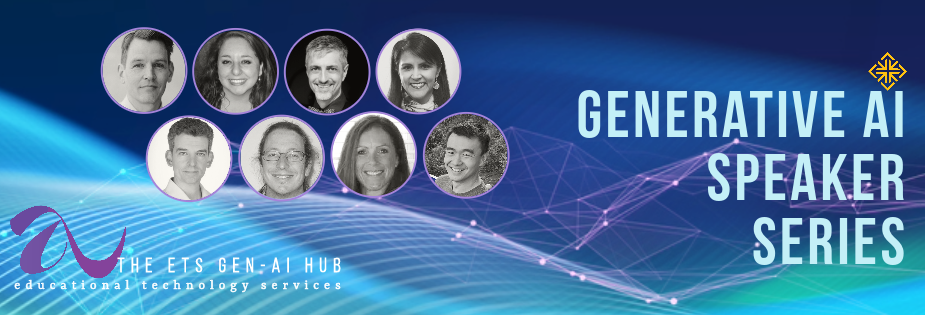
The future belongs to those who understand and leverage the power of artificial intelligence (AI). As generative models, a subfield of AI, continue to shape industries and redefine what is possible, there is an increasing need for experts, professionals, and the general public to understand its implications and potential. ETS is excited to present an opportunity to be at the forefront of this conversation.
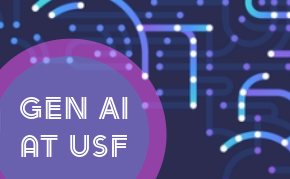
Learn more about various GenAI tools and explore strategies to support student learning.
Objectives:
To organize a series of high-profile speaker events focused on generative AI, its applications, ethics, and future prospects, bringing together faculty experts, researchers, and industry leaders as interested participants. The intention of the speaker series is to provide the following opportunities for presentation, discussion, and networking.
- Diverse Speaker Line-up: Renowned experts from academia, industry innovators, and thought leaders will provide insights on various topics related to generative AI.
- Hands-on Workshops: Participants can experience the power of generative AI through hands-on workshops, ensuring practical understanding.
- Networking Opportunities: Create an environment for professionals, students, and entrepreneurs to interact, share ideas, and build partnerships.
- Panel Discussions: A multi-disciplinary panel will discuss the ethical, societal, and economic implications of generative AI.
- Expand the awareness of Generative AI at USF.
Date: Thursday, September 14, 12-1 p.m. (via Zoom)
Presenters: Dr. Laura Otero and Chris Beem from Cal State Monterey Bay
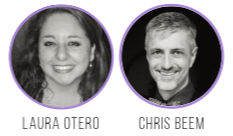 In this hands-on workshop led by Dr. Laura Otero and Chris Beem from Cal State Monterey Bay, you will gain practical experience working with generative AI tools to create text, images, and more. Through guided experimentation, you will learn what AI tools can produce in response to engineered prompts, and how we can use this information when it comes to writing our own assignments for our students. You will also learn strategies for responsibly integrating AI into your course development and teaching practices.
In this hands-on workshop led by Dr. Laura Otero and Chris Beem from Cal State Monterey Bay, you will gain practical experience working with generative AI tools to create text, images, and more. Through guided experimentation, you will learn what AI tools can produce in response to engineered prompts, and how we can use this information when it comes to writing our own assignments for our students. You will also learn strategies for responsibly integrating AI into your course development and teaching practices.
Laura Otero has over a decade of experience in academia specializing in online education and faculty development. She teaches for the School of Computing & Design at CSU Monterey Bay, where she is also an Instructional Designer for the Center for Academic Technologies. She earned her Bachelor's degree in Communication, her Master's degree in Education, and her Ph.D. in Instructional Technology Leadership. Her hands-on experience with generative Artificial Intelligence began in 2022 when she first used MidJourney to illustrate a short story.
Chris Beem is the Senior Instructional Designer at CSU Monterey Bay and has taught in their Master's in Instructional Technology program since 2012. He previously worked in technology project management for National Geographic School Publishing and as a Science Content Editor for CTB/McGraw-Hill. He has a Bachelor's in Biology from UC Santa Cruz and a Master's in Instructional Technology from CSU Monterey Bay. Chris is fascinated by the power of generative A.I. and has been using it to create text, art, and music.
Date: Tuesday, September 19, 12-1 p.m. (via Zoom)
Presenter: Professor, Chris Brooks, Computer Science, USF
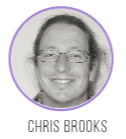 In this session, Chris will explain the basic technique of how Large Language Models (LLMs) predict the next word based on context, see how that can be extended to a chat session, and how it remembers the last question asked and what information is available, with the goal of better understanding of how to generate better prompts. By demystifying what is happening, this will hopefully make it easier for instructors to use these tools effectively.
In this session, Chris will explain the basic technique of how Large Language Models (LLMs) predict the next word based on context, see how that can be extended to a chat session, and how it remembers the last question asked and what information is available, with the goal of better understanding of how to generate better prompts. By demystifying what is happening, this will hopefully make it easier for instructors to use these tools effectively.
Chris is a professor in the Department of Computer Science at USF, with a joint appointment in the Department of Engineering. He joined USF in 2002 after completing a PhD in computer science at the University of Michigan. From 2010-2019, Professor Brooks served as associate dean of the College of Arts and Sciences at USF. In this role, he led a variety of initiatives, including the construction of the Lo Schiavo Center for Science and Innovation and the development of engineering at USF.
Professor Brooks' research examines the ways in which human and computational agents learn in shared environments, particularly when learning is difficult or costly. He also develops new techniques for effective teaching of computer science and AI, and is deeply invested in addressing issues at the nexus of social justice and computing.
Date: Tuesday, September 26, 1-2 p.m. (via Zoom)
Presenters: Heather Brown and Danny Liu, co-leaders of the Educause Community AI Forum:

Generative AI tools like ChatGPT present significant and urgent challenges to assessment in higher education. But the pace at which AI is moving is bewildering, so what can we do to not only keep up but stay ahead of the game? In this session, we will look at different generative AI tools and their implications for assessments, and discuss policies that might help provide guardrails and safety in your courses. We’ll also discuss assessment design and how we can respond in a sustainable way to both help students engage productively and responsibly with generative AI whilst ensuring learning and academic integrity. Together, we will consider whether generative AI can not just be part of the problem, but might be part of the solution as well.
Danny Liu is a molecular biologist by training, programmer by night, researcher and academic developer by day, and educator at heart. A multiple international and national teaching award winner, he works at the confluence of learning analytics, artificial intelligence, student engagement, educational technology, and professional development and leadership. He is an Associate Professor in the Deputy Vice-Chancellor (Education) Portfolio at the University of Sydney, and co-chairs the University's AI in Education working group.
Heather Brown, from Tidewater Community College in Virginia Beach, VA, is a dedicated instructional designer with extensive experience working in higher education and several years of experience working on high visibility commercial and military projects. She has developed engaging educational programs for various audiences using proven instructional theories, adult learning theories, and pedagogies as well as emerging technologies.
Date: Wednesday, October 4, 12-1 p.m. (via zoom)
Presenter: Kevin Kelly, EdD
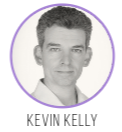 As dozens of conversations take place about AI–Artificial Intelligence–and its impact on education, many of us are looking for strategies for students to use AI in a positive way. In its recent guidelines, the University of Southern California Academic Senate suggests that “generative AI is simply the newest addition to USC’s digital literacy tools.” In this workshop we will take a look at generative AI–what is it and what can it do? Next we will explore ways to incorporate generative AI that also encourage students to submit original work and cite outside sources properly. As part of this exploration we will review a new assignment Kevin created for his online class this term. Lastly, we will look at equity issues related to student use of generative AI in college settings.
As dozens of conversations take place about AI–Artificial Intelligence–and its impact on education, many of us are looking for strategies for students to use AI in a positive way. In its recent guidelines, the University of Southern California Academic Senate suggests that “generative AI is simply the newest addition to USC’s digital literacy tools.” In this workshop we will take a look at generative AI–what is it and what can it do? Next we will explore ways to incorporate generative AI that also encourage students to submit original work and cite outside sources properly. As part of this exploration we will review a new assignment Kevin created for his online class this term. Lastly, we will look at equity issues related to student use of generative AI in college settings.
In this workshop, you will:
- Describe generative artificial intelligence (AI) and what it can do
- Explore how to incorporate generative AI tools into the teaching and learning process
- Discuss how to support students in using AI as a digital literacy tool in ways that align with academic integrity
- Investigate equity issues related to student use of generative AI in college settings
Kevin Kelly, EdD, works with colleges and universities as a consultant to address distance education, educational technology, and organizational challenges. He also teaches online courses in the Department of Equity, Leadership Studies, and Instructional Technologies at San Francisco State University. Kevin co-authored with Todd Zakrajsek the 2021 Stylus book, Advancing Online Teaching: Creating Equity-Based Digital Learning Environments.
Date: Wednesday, October 18, 12-1 p.m. (via zoom)
Presenter: Jonathan Hunt
 A wide variety of AI tools are available to writers today. How do we explore these tools in an ethical way that supports integrity in teaching and learning? How do we support students in their exploration of these tools? In this interactive session, we'll explore the ethical use of writing assignments for learning and assessment of learning in an AI age. We'll look at samples of student and faculty writing, and work on designing assignments that support integrity in academic work.
A wide variety of AI tools are available to writers today. How do we explore these tools in an ethical way that supports integrity in teaching and learning? How do we support students in their exploration of these tools? In this interactive session, we'll explore the ethical use of writing assignments for learning and assessment of learning in an AI age. We'll look at samples of student and faculty writing, and work on designing assignments that support integrity in academic work.
Jonathan Hunt is Professor in the Rhetoric and Language Department and Director of USF's Writing Center. He is a former Faculty Co-Director of the Seeley Center for Teaching Excellence and former chair of USF's Academic Integrity Committee.
Date: Tuesday, October 24, 12-1 p.m. (via zoom)
Presenter: Nicole Gonzales Howell
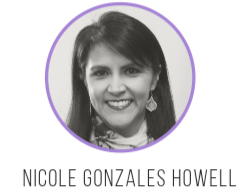 “Johnny Can’t Write” and sentiments of the like have been circulating in the dominant narrative about “kids these days” and their abilities to write and communicate for well over 50 years. With the advent of AI generators we now have a tool that can actually support student writing, yet it has been met with suspicion and contempt because it provides short-cuts and support to those that have not fully internalized the linguistic and cultural conventions of Standardized Academic English. In this session we work together to reflect on our language ideologies and how they impact our attitudes toward writing and writers in order to consider the potential of generative AI tools as well as the limitations.
“Johnny Can’t Write” and sentiments of the like have been circulating in the dominant narrative about “kids these days” and their abilities to write and communicate for well over 50 years. With the advent of AI generators we now have a tool that can actually support student writing, yet it has been met with suspicion and contempt because it provides short-cuts and support to those that have not fully internalized the linguistic and cultural conventions of Standardized Academic English. In this session we work together to reflect on our language ideologies and how they impact our attitudes toward writing and writers in order to consider the potential of generative AI tools as well as the limitations.
Nicole Gonzales Howell is an Associate Professor in the Rhetoric and Language Department and the Composition Area Director. She is a former Gerardo Marin Fellow and is currently the co-facilitator of the Pedagogy in the Age of AI Faculty Learning Community.